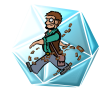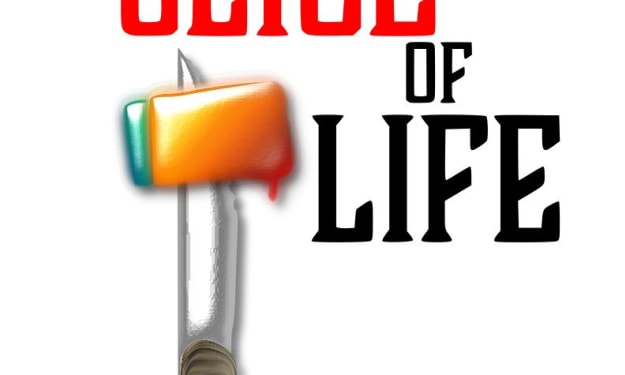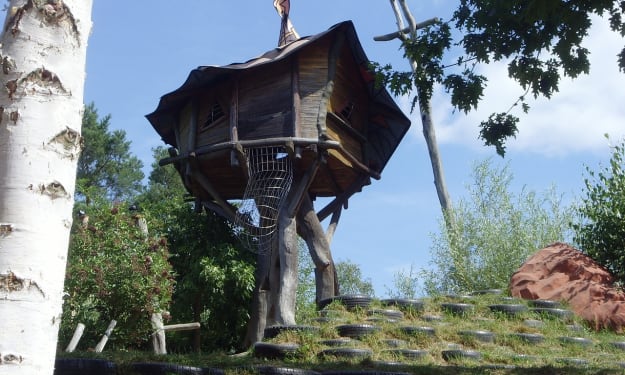An Honest Lie
In the dead of night at a diner, a final conversation ensues between brothers.

“So you are…”
“Your appraiser,” the man in the black pinstriped suit said, writing something into his notebook, the marigold pinned to his lapel shaking with every stroke of the pen. “Or actuary. Evaluator? Yes,” he paused and looked up, smiling. “Yes, that’s it, your exit evaluation.”
“You don’t know?” Kelly asked, raising his eyebrow.
The Evaluator replied, “No, well, yes. It’s a bit complicated.” His skin was pale, and his hair was pulled up into a style reminiscent of a man who ruined everything wherever he went. Kelly was sure he knew the name but the style seemed unimportant in the grand scheme of things. His black suit was pinstriped and slightly too small for him, pulling at the edges. He wrote with what appeared to be an ivory pen, the small cracks appearing in the edges filled with gold.
The glasses were the most interesting thing about the evaluator: not quite sunglasses, still translucent, a slight light appearing to crawl out from behind them.. No matter where the man looked, Kelly could not seem to see the man’s eyes.
Kelly waited for the man to find a stopping place, nervously fidgeting with the fake leather of the diner booth, a briefcase sitting next to him, slightly ajar. He had been in this spot many times before, enjoying Ma Booker’s famous flapjacks, or her equally famous, but not for the right reasons, coffee. Always so bitter, always too strong, always spilling over the edges of the mugs. And yet, that is exactly what Kelly wanted at this moment.
At last, the evaluator looked up, giving what should have been a warm smile. Kelly felt it was more akin to a crocodile sizing up a zebra.
“So,” Kelly said, taking a deep breath, “How does this work?”
“Quite simple,” the evaluator folded his hands together. “We are going to have a conversation. I will take notes as we do, and when we are done, I will send the report to the judges to determine where you are sent to.”
“You don’t decide?”
“Oh, most certainly not,” the evaluator chuckled. “Though I do suppose I do have a bit of a misrepresented reputation in your mythos.”
“So I am dead then.”
“Most definitely.”
“And you are Death?”
“I am called that.”
“But are you?”
“Death is a title, just as Reaper, Charon, Apollo, Yama, and so on.”
“So what do I call you?”
“What do you want to call me?” The evaluator took a sip of coffee which had appeared before the two of them. Or perhaps it had always been in front of them. Kelly raised an eyebrow at the question.
“Do you have a preference?” he finally responded. The evaluator smiled and wrote something quick in his journal.
“No,” he responded. “But this is your interview. What name would make this more comfortable?”
“Edwin,” Kelly decided.
“Ah, your brother’s name,” the evaluator nodded.
“You look like him,” Kelly explained, taking the coffee in front of him and taking a sip of the distasteful stuff. It warmed him in a familiar way, bringing back memories of him and his brother dining here after a long day of work.
“That was purposeful,” Edwin said. “I try to make the process as painless as possible. A lot of research goes into this, you see.”
“Then why the interview?”
“There is something merciful about giving you a chance to provide perspective. A chance for your view of the experience to be compared with the life we observed.”
Kelly found that he agreed with this philosophy. “Are there rules?” he asked.
“Certainly,” Edwin said, but proceeded to say nothing.
After a minute of waiting and his finger finding a small hole in the seat’s cover, Kelly cleared his throat, “May I hear them?”
“Of course,” Edwin flipped his journal to a page before closing it sharply and sitting up straight. “This interview will largely be performed by you, telling me the truth. You may tell me as many truths as you desire, as well as ask as many questions as you wish, but as soon as you speak a lie, the interview is over and the evaluation is sent.”
“Is there a time limit?”
“Time?”
“Like how long does the interview last? I imagine you have many others who have died or are dying. What limits do I have?”
Edwin shifted uncomfortably for a moment, before he responded: “It is...difficult to explain. You are a being of a linear timeline, while I am...not. When you die, you are not of your world, but of mine. And I exist in all, in a table of time, not a line. At this exact moment I am having an interview with 151,600 other people that died today, along with 1,245,014 individuals who died the day before or even further back in your timeline. I am still evaluating a poet from the 14th century, and Confucius is showing no signs of letting up any time soon.”
“That’s over 1500 years…”
“In your line, yes,” Edwin smiled. “But to be fair, he did die next to a waterfall so it makes for a lovely meditation spot. We speak only occasionally, but when we do, it is quite lovely.” Kelly wondered whether “he” referred to Confucius or the poet but was distracted by another question.
“So I am in the spot where I died?”
“A recreation of it,” Edwin said, taking another sip. “The diner is...well it moves on, while you stay in the moment until you decide to move.”
“I suppose it could be worse,” Kelly said, taking in the surroundings again, the lights flickering as they always had in life.
“Most certainly. So many face the doldrums of hospital beds or sleeping quarters, others the horrors of a deep crevice in the earth. If it is too dark of an end, I do my best to make it a little more hospitable. I am currently in a rather charming recreation of an enlarged tent on the slopes of mount Everest with an unfortunate climber, buried in the snow. We are sitting on couches made of soft moss and stones while I impersonate his partner who is carrying his body back down the mountain.”
Kelly wanted to make a comment about the foolishness of the man he had just heard about but wondered if a declaration like that would constitute a lie. He made a mental note to not voice opinions on others' situations. After all, who was he to judge the dead, when Death itself was not?
“Can I ask how I died?”
“You can,” Edwin nodded. “But it is generally ill-advised. Most deaths are more complicated and stem from preceding events that are painful. My advice is make sure you’re ready.”
Kelly nodded and put his finger in the hole in the seat again, focusing on the marigold on Edwin’s chest. He did not ask further.
“I think I was happy,” Kelly said instead, making sure to add the qualifier. “But I definitely made mistakes. I tried to make those around me happy. I tried to forgive those that wronged me. But I feel like it wasn't enough.”
“Interesting assessment,” Edwin said, opening his journal again and writing enthusiastically.
Kelly breathed deep, debating what part he wanted to focus his words on.
“I was never successful by my parents’ standards. I went to school, got decent enough grades, and got a job as an English teacher. But my parents wanted someone who made money, brought home the bacon, who didn’t take on loans, who wasn’t a burden. That was my brother. That was Edwin. Somehow he managed to find the money to make all the ends meet. When dad had cancer, Edwin had the check. When the house was falling apart, Edwin was there, financing the repairs. When mom died, he had the funeral covered.”
“Edwin” nodded and continued writing.
“Edwin and I met here after work, almost every day. He always showed up in a pinstriped suit and a small rose on his lapel. He never once told me what he did, or how he got the money. I never asked. I wanted to, that I know. I wanted to know how he was able to get the nice suits, the fancy house, the beautiful car.” He paused as his eyes drifted toward the kitchen. “But I was scared that the answer would be something darker. Something untoward.” His finger went deeper into the hole of the cushion. “Or worse yet, that it was something legit and I was actually the failure that my parents thought I was. That I thought I was.” Kelly looked back at “Edwin.” “You told me that I was doing something noble. That I should take pride in my profession and my life choices. But I never believed it.
“Then you pulled up in that car and drove me somewhere else. A field of marigolds, outside the city limits. You were covered in something dark and filled the air with the stench of smoke and sulfur. You handed me the briefcase and told me to go somewhere safe. Then you told me that you were jealous of my life, of my decisions. That you wished you had followed me and done something worthwhile. Then…” Kelly found that he didn't want to finish that sentence and coughed gently.
“I came here, to the diner, because I didn’t want to go home. I didn’t want to face the reality that you had shown me. I came here because I knew you would show up again, despite the fact that I left you in the car. Despite the fact that your decisions would likely follow me here.” He pulled his finger out of the hole in the cushion and saw the same dark-red liquid from the car was dripping gently down his finger now, a small metal ball falling from his hand, bouncing on the tile below. Kelly sighed and wiped his finger on the table, painting a line that slowly dissipated into the air. He watched it vanish before looking at “Edwin.”
“So you are everywhere now? With every one of us who had died? Every one of us still telling truths?”
“I am,” the evaluator said.
“Can you relay a message to my brother? The real Edwin, the one in the car, not the one who sits here before me.”
“I can,” Edwin nodded.
Kelly drew in one more deep breath then spoke in almost a whisper. “I’m going to move forward in a moment. In case we don’t see each other, know that I love you. I never stopped loving you. I don’t care what you did to get us here, I’m just grateful for the time we had. I hope you find peace.”
“Edwin” smiled and paused his writing. The light from behind his glasses glowed and fluttered like wings of a butterfly. Then in the voice of the real Edwin, he spoke: “I’m looking forward to seeing you soon. Thank you for being there for me. I love you too.”
Kelly smiled and wiped a tear from his eye. He let what felt like hours drift by.
“Did any of us get it right?” he finally asked.
“Some of you did. Some got pieces of it, some more than others. Once, one of you got everything correct, but only because they listened to what everyone else was saying and pieced the whole picture together into a beautiful tapestry of love and light. But some of you were jealous and ruined it all for everyone else.”
“Doesn’t seem fair,” Kelly said.
“Never is,” Edwin agreed. “Works out in the end though.”
Kelly nodded and turned to shut the briefcase completely. “Alright,” he said. “I’m ready.”
“A lie,” smiled Edwin, shutting his notebook with a flourish, the pen disappearing into his suit as he rose to his feet. He held out a hand to Kelly. “But an honest one to be sure.”
About the Creator
Ethan J Bearden
I am a Middle School English teacher of nearly 10 years. I have been writing most of my life, even dabbling in self publishing in my early years. I have two books to my name, "The Eyes of the Angel," and "Project Villainous: a Tragedy."






Comments
There are no comments for this story
Be the first to respond and start the conversation.